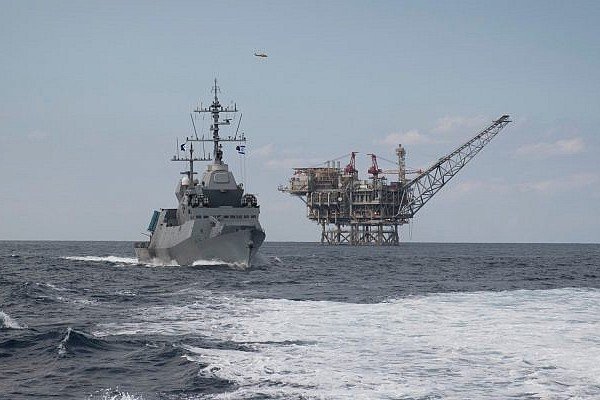
Lebanese officials raise threats as process of anchoring rig and connecting it to operating systems begins 80 kilometers off Haifa.
The Israeli Navy is is gearing up to protect offshore gas rigs from Hezbollah attacks, according to Hebrew media reports. Navy vessels, submarines, a sea-based Iron Dome system and marine sensory systems are being deployed.
The measures come as Lebanon and Hezbollah have threatened Israeli drilling in Karish, saying it lies in Lebanese waters. Jerusalem says Karish, Israel’s northernmost field, is unequivocally in its exclusive economic zone.
The field is said to hold an estimated 1.4 trillion cubic feet of gas.
Energean, a British-Greek energy company, announced this weekend that its floating production storage and offloading rig arrived at Karish at a point 80 km off Haifa.
The company, which holds exclusive rights to explore and extract gas from Karish, said it has already begun the process of anchoring the rig and connecting it to the gas field’s operating systems. Energean said it expects to begin pumping gas in the third quarter of 2022.
Lebanese President Michel Aoun said “any action or activity in the disputed area represents a provocation and an aggressive action.”
Caretaker Prime Minister Najib Mikati accused Israel of “encroaching on Lebanon’s maritime wealth and imposing a fait accompli in a disputed area.”
Israeli officials didn’t comment on the Lebanese threats. Energy Minister Karine Elharrar said she looked forward to expanding gas exports to Jordan, Egypt and Europe when Karish goes online.
“We will continue to work to diversify the energy market and maintain stability and reliability,” Elharrar said.
But Walla News cited an Israeli official who denounced Beirut’s claims as “lies,” saying that the allegations “contradict the positions that Lebanon itself presented in the past.” The official was referring to U.S. efforts to mediate an agreement on the maritime border during the presidencies of Barack Obama and Donald Trump.
In maps filed with the UN in 2011, Lebanon initially claimed an 860 sq. km triangular area of the eastern Mediterranean, which did not include Karish. However, in 2020, Lebanon began claiming an additional 1,430 sq. km of waters which included Karish. Israeli diplomats referred to Lebanon’s new claim as a “war of the maps.”
Hezbollah gave its consent to the U.S. mediation, but Sheikh Hassan Nasrallah reversed that position in May with his own threat.
“I can guarantee you that no international firm would dare come to the Karish gas field or to anywhere else in the disputed area if Hezbollah issues a clear and serious threat in this matter,” Nasrallah said.
Estimates based on seismic studies suggest Lebanon’s exclusive economic zone may contain up to 25 trillion cubic feet of natural gas. However, Beirut has been unable to exploit its offshore gas because of political instability, paralysis and corruption.
Haaretz reported that the Knesset’s Economy Committee gave its assent to bar maritime traffic around the rig, which is standard practice for operational platforms.
(United with Israel).